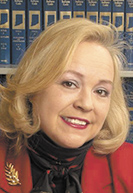Subscriber Benefit
As a subscriber you can listen to articles at work, in the car, or while you work out. Subscribe NowFrom the filing of the first complaint in 2014 to an appellate court decision, Indiana’s ban on same-sex marriage was overturned in a little less than seven months.
Comparatively, a group of married lesbian couples have been waiting 10 months for the 7th Circuit Court of Appeals to either affirm or reverse a lower court’s ruling enabling both women’s names to be listed on their children’s birth certificates.
Attorneys see the slower pace as a return to normal.
The pace of cases challenging same-sex marriage bans across the country swelled after the Supreme Court of the United States issued its ruling in United States v. Windsor, 570 U.S. ___ (2013). There the majority held federal interpretation of marriage as only between a man and a woman was unconstitutional.
 Sanders
SandersSteve Sanders, Indiana University Maurer School of Law professor, sees the language in the Windsor decision as having sent an encouraging message to proponents of same-sex marriage. National groups such as Lambda Legal and the American Civil Liberties Union began challenging state bans with individual lawsuits filed in federal court.
That action, Sanders continued, artificially inflated the amount of litigation as state laws were challenged on a state-by-state basis. The pace of decisions quickened with district and circuit courts overturning the same-sex marriage prohibitions in the summer and fall of 2014.
Then, the Supreme Court legalized same-sex marriage with its split decision in Obergefell v. Hodges, 576 U.S. ___(2015).
Now, said Indianapolis attorney Karen Celestino-Horseman of Austin & Jones, P.C., as new cases are filed regarding rights and discrimination against gay, lesbian, bi-sexual and transgender individuals, the courts are looking at the precedent and interpreting its meaning. There is no standard for when these subsequent decisions have to be handed down.
 Celestino-Horseman
Celestino-HorsemanIn the case of the birth certificates, the Hoosier women are just having to wait.
Eight married lesbian couples filed a lawsuit in February 2015 after the non-birth mothers were prohibited from having their names listed as a parent on the babies’ birth certificates. The U.S. District Court for the Southern District of Indiana in June 2016 found the prohibition violated the Equal Protection and Due Process clauses of the 14th Amendment.
Indiana appealed and the 7th Circuit heard oral arguments May 2017 in Ashley and Ruby Henderson, et al. v. Dr. Jerome M. Adams, 17-1141. The plaintiffs are represented by Celestino-Horseman, William Groth of Fillenwarth Dennerline Groth & Towe, LLP, Richard Mann and Megan Gehring of Mann Law, P.C., and Raymond Faust of Norris Choplin Schroeder LLP.
About a month later, the U.S. Supreme Court issued a decision in Pavan v. Smith, a very similar birth certificate dispute in Arkansas. The Arkansas Supreme Court had barred the married non-birth mothers from being listed on the documents, but a majority of the justices in Washington, D.C., reiterated Obergefell afforded same-sex marriage spouses the full “constellation of benefits,” which includes being identified as parents on the children’s birth certificates.
Sanders and the team representing the Indiana mothers view the Pavan decision applied to the Henderson case.
Indiana Attorney General Curtis Hill did not agree. When the Pavan ruling was issued, his office issued a statement saying the ruling did not impact the Indiana’s birth certificate dispute but no explanation for that stance was offered.
In addition to birth certificates, courts are also having to decide fights over expanse and limitations of LGBT rights in Title VII of the Civil Rights Act of 1964 and in the context of religious freedom. However, Sanders noted these disputes are nothing like the backlash that followed, for example, desegregation, and the pace of the decisions is only slower in contrast to the fast tempo of the same-sex marriage rulings.
Also, he said, the LGBT community might have to start looking for legislative solutions rather than the courts. The Title VII cases, asking whether the discrimination provision covers sexual orientation, are an end run around what would be a difficult task of getting Congress to expand the law.
The 7th Circuit in Hively v. Ivy Tech, 15-1720 was the first appellate court to rule that Title VII’s ban against discrimination on the basis of sex included sexual orientation. Since then, an 11th Circuit panel took the opposite view in Evans v. Georgia Regional Hospital, 17-370, and the 2nd Circuit has yet to issue a ruling on the same question in Zarda v. Altitude Express, 15-3775.
Still, Celestino-Horseman pointed out the courts may be the only avenue for remedy. Although the 7th Circuit panel repeatedly indicated the birth certificate question was better answered in the Statehouse than the courtroom, she fears bringing the issue up in the Legislature will spark a new debate over same-sex marriage.
In the meantime, an injunction remains in place allowing female same-sex married couples to put both their names on the birth certificates. Still, the women are wondering what will happen if the 7th Circuit reverses. They regularly contact Celestino-Horseman and she assures them, they will be notified as soon as a decision is issued.•
Please enable JavaScript to view this content.
